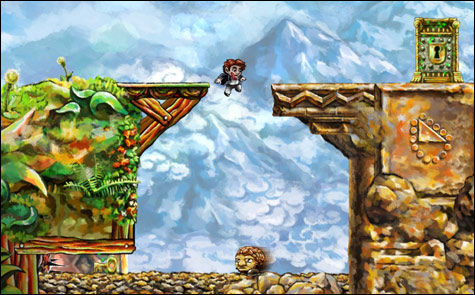
PAST? FUTURE? Teaching your brain to make sense of Braid’s twisted timelines is a true pleasure. |
| Braid | For Xbox Live Arcade | Rated E10+ for Everyone 10 and Older | Developed by Number None Inc. | Published by Microsoft |
What if you could do things over again? Not just try again after failure, but actually undo your mistakes? What if you could rewind past the point at which it all went wrong? What if you could repair the things you’ve broken? Braid attempts to answer these questions: they inform the gameplay and set up the storyline, and they inspire a singular and haunting gaming experience.On the surface, Braid seems to take its cues from 8-bit games, notably Super Mario Bros. Tim is a worried-looking young man on a quest to rescue a girl the game refers to as the Princess. To do so, he must collect puzzle pieces scattered across hazardous, two-dimensional worlds and defeat crawling enemies with a well-placed jump. But Braid has more on its mind than winking at the audience. It seeks to demolish the precepts that have defined platforming gameplay for more than 20 years.
Since the birth of arcades, games have trafficked in punishment. Instant character deaths and game-over screens were the best way to ensure that players in the grip of Pac-Man fever kept pumping quarters into the machine. Braid eschews all that and gives you a simple rewind button. Pummeled by an enemy? Rewind to before the collision. Missed a tricky jump? Just hold down the X button and Tim will levitate back to safety. Failure, in the familiar sense of the word, is impossible.
This is not to suggest that Braid is easy. Quite the contrary. In each of the game’s six worlds, a new wrinkle is introduced. Once the rewinding function has been established, Tim runs across clearly marked objects and enemies that are anchored to the forward timeline. Later on, he’ll find that time moves forward as he walks to the right and backward as he walks to the left. He’ll acquire a ring that slows down time within a certain radius. He’ll acquire a doppelgänger that mimics his movements in the future. All this sounds complicated, but the rules are plainly stated and consistent throughout.
From these innovations spring puzzles of astounding ingenuity. Most of the pieces Tim must assemble are kept behind locked doors, with the keys hidden elsewhere in the level — the components here may be familiar, but they’re put to bold and imaginative ends. Teaching your brain to make sense of Braid’s twisted timelines is one of the game’s true pleasures, so I won’t describe the puzzles in detail. Suffice to say that Braid toys with your temporal perceptions in much the same way that Portal wreaked havoc with your sense of spatiality.
And like Portal, Braid has revealed an unexpected drama by the end of its too-brief playing time. Tim’s search for the Princess isn’t an adventure to rescue some damsel in distress; it’s a dreamlike effort to piece together the fragments of a relationship. His quest turns out to be about finding the lost pieces of himself.
This is a game in which everything comes together in perfect harmony. Whether it’s the hand-painted visuals, the oblique textual narration, or the darkening storyline, Braid casts a spell. During development, it got its share of attention for the sometimes colorful personality of its creator and sole designer, Jonathan Blow. Since its release, debate has raged as to whether Braid is an artistic high-water mark or pretentious wankery.
But there’s no need to decide at this moment whether Braid is an important game. That’s for history to decide. Enough for now to say that it’s a damn good one.